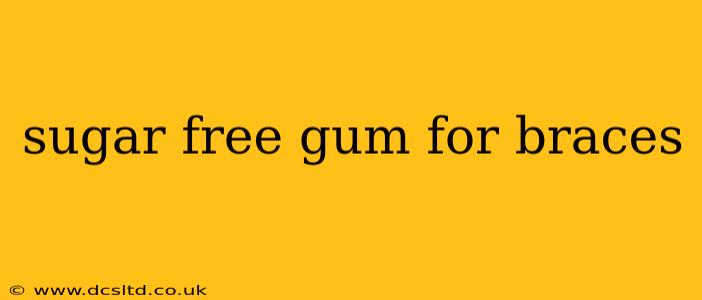Having braces can significantly impact your diet, often requiring you to avoid sticky, hard, and sugary foods. But what about chewing gum? Many find it helpful for freshening breath and stimulating saliva production, both beneficial for oral hygiene. The key is choosing the right gum—specifically, sugar-free gum for braces. This comprehensive guide will explore the benefits, considerations, and best practices for using sugar-free gum while wearing braces.
What are the Benefits of Chewing Sugar-Free Gum with Braces?
Sugar-free gum offers several advantages for individuals with braces:
- Increased Saliva Production: Chewing stimulates saliva flow. Saliva is crucial for neutralizing acids produced by bacteria, reducing the risk of cavities and gum disease. This is especially important with braces, as food particles can get trapped more easily.
- Improved Breath Freshness: Gum helps mask bad breath caused by trapped food particles around brackets and wires.
- Jaw Exercise (to a degree): Gentle chewing can help strengthen jaw muscles, although it's not a substitute for proper jaw exercises recommended by an orthodontist.
Is All Sugar-Free Gum Suitable for Braces?
No. While "sugar-free" is a crucial element, the type of sugar-free gum matters. Avoid:
- Gum with Xylitol: While xylitol is a sugar alcohol often found in sugar-free gum, it can be detrimental to some dogs if ingested. Keep it out of reach of pets. While generally safe for humans, some individuals might experience digestive upset.
- Hard or Chewy Gums: These can damage or dislodge your braces. Stick to softer varieties.
- Gums with Large, Hard Pieces: These could break or bend your braces.
- Gums that Stick to Braces Excessively: Some gums can adhere strongly to the brackets, making cleaning more difficult.
Opt for soft, sugar-free gums specifically labeled as being suitable for people with braces.
What Types of Sugar-Free Gum are Best for Braces?
Look for sugar-free gum sweetened with artificial sweeteners like aspartame, sucralose, or stevia. Many brands offer "braces-friendly" options. Always check the ingredients list before purchasing. Reading reviews from others with braces can also be helpful in identifying suitable brands and types.
Can Chewing Gum Damage Braces?
While sugar-free gum generally won't harm your braces, excessive chewing or chewing on very hard types of gum can:
- Loosen brackets: Aggressive chewing can put pressure on the brackets, potentially causing them to loosen or detach.
- Bend wires: The wires are delicate, and excessive force from chewing can bend or break them, disrupting treatment.
Chew gently and avoid excessive chewing.
What are Some Alternatives to Sugar-Free Gum for Freshening Breath with Braces?
If you're concerned about gum, consider these alternatives:
- Sugar-free mints: These are often a softer option than gum.
- Mouthwash: Use a fluoride mouthwash to help keep teeth clean and freshen breath.
- Regular brushing and flossing: This remains the most effective way to keep your mouth clean and fresh, especially crucial with braces.
How Often Should I Chew Sugar-Free Gum with Braces?
Moderation is key. While chewing sugar-free gum can be beneficial, it's not a replacement for good oral hygiene. Limit chewing to a few times a day, and always brush and floss thoroughly afterward.
Does Chewing Sugar-Free Gum Help with Braces Pain?
While chewing might stimulate blood flow and potentially offer slight temporary relief from minor brace discomfort, it's not a primary pain-relief method. For significant pain or discomfort, always contact your orthodontist.
Remember, maintaining excellent oral hygiene is paramount with braces. While sugar-free gum can be a helpful addition to your oral care routine, it shouldn't replace thorough brushing, flossing, and regular visits to your orthodontist. Always consult with your orthodontist before incorporating new products or habits into your oral care routine while wearing braces.
